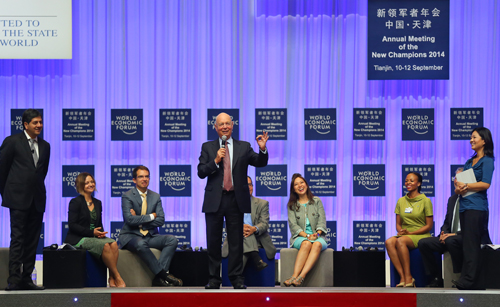|
 |
|
TALKING WITH PASSION: Klaus Schwab, Executive Chairman of the World Economic Forum, speaks during the Annual Meeting of the New Champions 2014, also known as the Summer Davos, on September 11 (CFP) |
Reforms
"A key question for policymakers is what structure to reform," argued Zhu, pointing out that each and every sector of the economy, such as infrastructure construction, the labor market and pensions, needs a specific plan, not a general conception.
In fact, steps have been quickened to boost the service industry. In the first half of the year, the number of newly registered service businesses surged by more than 70 percent and the service industry outperformed the manufacturing industry in terms of growth rate and share of GDP, said Premier Li in his speech at the opening ceremony.
Li Daokui believes the new growth engines consist of consumption-based infrastructure investment, private consumption, and the greening up of production capacity from steel, petrochemical industry to power generation.
In the first half of the year, the growth in investment and production of industries with high energy consumption and emissions noticeably slowed down, the per-unit GDP energy consumption dropped by 4.2 percent year on year, and carbon intensity was cut by about 5 percent, the largest decline in the past few years, according to Premier Li.
Beyond that, the country is also prepared to embrace a bottom-up reform featuring endeavors to reform state-owned enterprises (SOEs). As early as February, China's largest state-owned oil-refining company China Petroleum & Chemical Corp. (Sinopec) took the initiative to open up its domestic marketing and distribution operations to private investors.
"SOEs' reform does not just mean the introduction of mixed ownership. In fact, the diversification of shareholding has been in progress since 1984, and now it's promoted more as a main model making up China's basic economic system," said Fu Chengyu, Chairman of Sinopec.
Fu argued SOEs should build up their core competitiveness as private companies do, and the recipe is to expose themselves to the market and de-administration. In other words, the reform doesn't mean the elimination or privatization of SOEs, but the modernization of the corporate governance system.
"All the companies should be thrown into the sea of the market, in which they would elbow to win favor from consumers by virtue of high quality and advanced technologies," said Dong Mingzhu, President of Gree Electric Appliances of Zhuhai, noting that excessive administrative governance would severely undermine the long-term viability and growth of enterprises.
 |
|
WIDE PARTICIPATION: Citizen representatives from Tianjin take part in a panel discussion during the Summer Davos on September 10 (CFP) |
Innovation
In his speech at the opening ceremony, Premier Li laid an emphasis on promoting institutional innovation as well as innovation in science and technology, and expressed confidence in China's innovative potential.
"Just imagine how big an innovation force it could be when the 800 million or 900 million workers among the 1.3-billion population become enthusiastic about entrepreneurship and innovation," he said, proclaiming it the fuel of sustained economic development.
China ranks 28th in the Global Compe-titiveness Report 2014-15, holding the lead among the BRICS (Brazil, Russia, Indian, South Africa and China), partly because of its favorable environment for entrepreneurship and innovation, which will continue to top the agenda of China's development in the days to come.
To give more space to entrepreneurship and ensure that the blood of innovation can filter into the social fabric of China, the government hopes to complete the task of removing and delegating items subject to government approval within a two-year period.
In addition to streamlined administration, institutional improvement is also underway. A list of administrative powers, which defines the scope of what government should do, will be published to prevent the abuse of power; a negative list, which defines areas off-limits to businesses, will be formulated to increase transparency and fully unleash the vitality of enterprises; and a list of government responsibilities, which defines how the government should regulate the market, will be put in place to expose its actions to public scrutiny.
The three lists supplement each other and will ensure the legitimacy of government power, the transparency of corporate innovation and the rationality of market competition, said Xin Ming, a media commentator.
| 